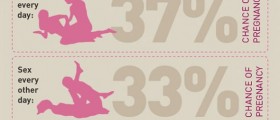
Menstruation, or the shedding of the uterine lining, occurs on a regular basis in females capable of reproduction. Menstruation is also called a period, and it takes place every month if no pregnancy occurs. Menstruation starts at the onset of puberty and lasts until the beginning of menopause. A girl can get her first period anytime between the ages of 8 and 15. Actually, menstruation is the most visible part of a menstrual cycle, which is a series of physiological changes that occurs in fertile females. The menstrual cycle is governed by the endocrine system, and this is why women normally experience various physical sensations and emotional reactions prior to or at the time of menstruation. Women may feel cramping, pain, migraine headaches, depression, emotional sensitivity, changes in libido, breast swelling, etc.
How long does the normal period last?
Typically, a period lasts for a couple of days. Usually it lasts from 3 to 5 days, but anything ranging from 2 to 8 days is considered normal. The duration of a period is different in different women. Even the same individual may have periods of different lengths. The period may be very light or accompanied with heavy bleeding. An average woman will lose about 35 millimeters of blood during a single period. For the first few years after menstruation begins, longer cycles are common. In most healthy women, the cycles will shorten and become more regular with age.
Periods and birth control pills
Birth control pills are taken by mouth to inhibit female fertility. It is estimated that more than 100 million women worldwide use this kind of contraception. If taken regularly, these pills stop the ovulation and prevent the ovaries from releasing the eggs. Moreover, pills thicken the cervical mucus, making it harder for sperm to enter the uterus. Hormones contained in them guide the total effect of pills. Most women will continue having periods of same duration, but 80% of them will report physical changes in association with menstruation. It is estimated that 20–40% of women endure negative cycle-related symptoms. Normally, a period on birth control pills lasts 2-9 days but some women may experience periods lasting up to 12 days.
Irregular periods
It is not unusual, especially in the first two years after getting a first period, to skip periods or to have an irregular menstrual cycle. Many other factors may also contribute to irregular periods: illness, rapid changes in weight, excessive stress or climate change. Many women get regular periods most of the time, but occasionally skip a period or get an extra period during times of pressure or stress. The time span of irregular menstrual cycles may just slightly vary from 3 to 10 days.

















Your thoughts on this
Loading...